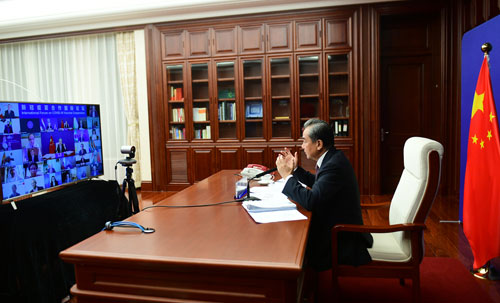First COVID-19 vaccine international conference appeals for global unity
By Stephen Ndegwa, August 7, 2021
China hosted the first meeting of the International Forum on COVID-19 Vaccine Cooperation on August 7. It was a forum that was critical at this juncture as the pandemic continues unabated all over the world.
Part of the problem in fighting the escalating health crisis is that not every country is on the same page in addressing the scourge, particularly regarding vaccines. Due to various reasons, there are great discrepancies on the percentage of vaccinated people across regions and countries.
Developing countries are obviously disadvantaged due to poor economic conditions. In Africa, for instance, vaccination rates remain low compared with the rest of the world with less than two percent of the continent’s population fully vaccinated. Recently, some selected countries like Egypt and South Africa have started the production of vaccines in-country, with the supplies of vaccines increasing as developed countries contribute more to Covax, the global vaccine-sharing scheme.
But now there is great hope after China restated its commitment to offer its vaccines as part of its promise to create a global health community for all. Speaking during the Global Health Summit held on August 5, President Xi Jinping China’s efforts in five areas in support of global solidarity against COVID-19, including the proposal of setting up an international forum on vaccine cooperation so that countries and companies engaged in the development and production of vaccines and other stakeholders may explore ways of promoting fair and equitable distribution of vaccines around the world.
Of utmost importance, Xi noted that research should now move to developing vaccines for the new mutants, which threaten to erode the gains made so far using the current crop of vaccines. Further, he criticized countries engaged in vaccine nationalism, saying new strides should be made “toward realizing vaccine fairness and accessibility across the world, lend new impetus to solidarity and cooperation among developing countries, and make new contribution to humanity’s early victory over the pandemic.”
Already, the country has honored its commitment by providing free vaccines to more than 80 developing countries in urgent need and exporting vaccines to 43 countries. It has provided two billion US dollars in assistance for the COVID-19 response and economic and social recovery in developing countries reeling under the pandemic, sent medical supplies to more than 150 countries and 13 international organisations, provided more than 280 billion masks, 3.4 billion protective suits and 4 billion testing kits to the world. In 2021, China has pledged to provide two billion doses of vaccines to the world and donate USD 100 million to the COVAX Facility for to developing countries.
Hosting the meeting, State Councilor and Foreign Minister Wang Yi reiterated that vaccines are a crucial part in the fight against the pandemic. Yes, it is about the people, not profits. Big Pharma should not make money by dancing on people’s graves. For once, they need to help their customers to survive so that they can continue selling drugs to them.

It is time for rich countries, as represented by the G20, need to close ranks with the rest of humanity to expedite the process of ensuring universal vaccination. Indeed, we need to “lose no time in remedying deficiencies, closing loopholes and strengthening weak links in a bid to enhance preparedness and capacity for coping with major public health emergencies.”
Wang proposed five main issues that need to be considered in fighting the pandemic. First, let us ut people and their lives first. People are at the centre of all efforts aimed at fighting the coronavirus. Therefore, no one should be left behind in any initiative aimed at minimizing the pandemic’s impact.
Secondly, follow science-based policies and ensure a coordinated and systematic response. This means that politics and other partisan interests should be kept out of the way. Science includes coordinating pharmacological and non-pharmacological interventions, balancing targeted routine COVID-19 protocols and emergency measures, and ensuring both epidemic control and socio-economic development.
Thirdly, promote solidarity and cooperation. The pandemic has shown us that we are all sailing on the same boat. The pandemic is yet another reminder that we humanity rise and fall together with a shared future.
Fourthly, we must uphold fairness and equity as we strive to close the immunization gap. Vaccines should be made a global public good. The world should reject vaccine nationalism and find solutions to issues concerning the production capacity and distribution of vaccines, in order to make vaccines more accessible and affordable in developing countries. Further, multilateral financial institutions should provide inclusive financing support for vaccine procurement of developing countries. The World Health Organization should speed up efforts under the COVID-19 Vaccine Global Access facility.
Lastly, let us address both the symptoms and root causes of the pandemic as we improve the governance system. It is important that we strengthen and leverage the role of the UN and the WHO and improve the global disease prevention and control system to better prevent and respond to future pandemics.
The writer is the Executive Director of South-South Dialogues, a Nairobi based research and development communication think tank.